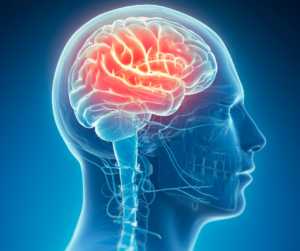Effects of a Stroke on the Brain
 Every stroke is unique, but strokes tend to affect people in common ways.
Every stroke is unique, but strokes tend to affect people in common ways.
To better understand what happens with a stroke, let’s take a closer look at the human brain and its functions.
The brain is the central organ of the human nervous system. This extremely complex organ controls both motor and sensory functions throughout the body:
- Helps you receive and interpret information from your senses (eyes, ears, nose).
- Is responsible for thinking, remembering, understanding, planning, reasoning, and problem-solving.
- The brain is made up of billions of neurons (brain cells) that communicate through synapses.
If a stroke occurs and blood flow can’t reach the region that controls a particular body function, that part of the body won’t work as it should. How you are affected by a stroke depends primarily on the location and the extent of damage to the brain tissue. Because nearly all of the signals from the brain to the body and vice versa cross over on their way to and from the brain, this results in each side of the brain controlling the opposite side of the body.
- A stroke on the left side of the brain affects the right side of the body.
- A stroke on the right side of the brain affects the left side of the body.
- If the stroke occurs toward the back of the brain, it’s likely that some disability involving vision will result.
Left Brain
If the stroke occurs in the left side of the brain, the right side of the body will be affected, usually producing:
- Paralysis on the right side of the body
- Sensory changes on the right side of the body
- Speech/language problems
- Abstract thinking
- Problems with thinking and memory
- Slow, cautious behavioral style
Right Brain
If the stroke occurs in the right side of the brain, the left side of the body will be affected, usually producing:
- Paralysis on the left side of the body
- Sensory changes on the left side of the body
- Vision problems
- Spatial thinking or imagery
- Problems with thinking and memory Quick, inquisitive behavioral style
Brain Stem
When a stroke occurs in the brain stem, it can affect both sides of the body.
The most severe damage could leave someone in a ‘locked-in’ state. The locked-in state is a condition in which the patient is generally unable to speak and can’t move because of the paralysis of muscles except for vertical eye movements and blinking. The person remains conscious, they can hear, think, reason, and comprehend. Communication is established through eye movements.
Brain stem strokes can have complex symptoms and can be hard to diagnose. A person may have vertigo, dizziness, and severe imbalance without the hallmark of most strokes — weakness on one side of the body. Vertigo dizziness symptoms or imbalance usually occur together; dizziness alone is not a sign of stroke. A brain stem stroke can also cause double vision, slurred speech, and decreased consciousness.
Only a half-inch in diameter, the brain stem controls all basic activities of the central nervous system: consciousness, blood pressure, and breathing. All motor control for the body flows through it. Brain stem strokes can impair any or all these functions. More severe brain stem strokes can cause locked-in syndrome, a condition in which survivors can move only their eyes.
If a stroke in the brain stem results from a clot, the faster blood flow can be restored, the better the chances for recovery.
Like all strokes, brain stem strokes produce a wide spectrum of deficits and recovery. Whether a survivor has minor or severe deficits depends on the location of the stroke within the brain stem, the extent of injury, and how quickly treatment is provided.
Risk factors for brain stem stroke are the same as for strokes in other areas of the brain: high blood pressure, diabetes, heart disease, atrial fibrillation, and smoking. Similarly, brain stem strokes can be caused by a clot or a hemorrhage. Rare causes include injury to an artery due to sudden head or neck movements.
Recovery is possible. Because brain stem strokes don’t usually affect language ability, the patient is often able to participate more fully in rehabilitation. Double vision and vertigo usually resolve after several weeks of recovery in mild to moderate brain stem strokes.
Cognitive impairment
Cognitive impairments and memory loss following a stroke are common and may affect your quality of life. This means that the way your brain understands, organizes and stores information is affected. Problem-solving ability is usually more prevalent in stroke survivors who had a right-brain stroke.
Typical cognitive problems may include:
- poor concentration or attention
- forgetfulness
- confusion
- inability to process information normally
- trouble with answering questions, planning, following conversations, remembering important facts, understanding where they are, reasoning or making judgments.
Stroke survivors with cognitive impairment may act without regard for safety without realizing what is happening. Medical history assessment, followed by physical and neurological examination of the stroke survivor are the first steps in proper diagnosis.
Emotional and Behavioral Effects of Having a Stroke
Emotional and behavioral changes are a common effect of stroke. Not only can stroke impact one’s mood and outlook, but the area of the brain injury and chemical changes may have significant effects on the brain.
After a stroke, survivors often experience a range of emotional and behavioral changes. The reason is simple. Stroke impacts the brain, and the brain controls our behavior and emotions.
You or your loved one may experience feelings of irritability, forgetfulness, carelessness, inattention or confusion. Feelings of fear, frustration, anger, grief, sadness, anxiety, and depression are also common.
The good news is many disabilities resulting from stroke tend to improve over time. Likewise, behavioral and emotional changes also tend to improve. Time is on your side.
https://www.stroke.org/en/about-stroke/effects-of-stroke
